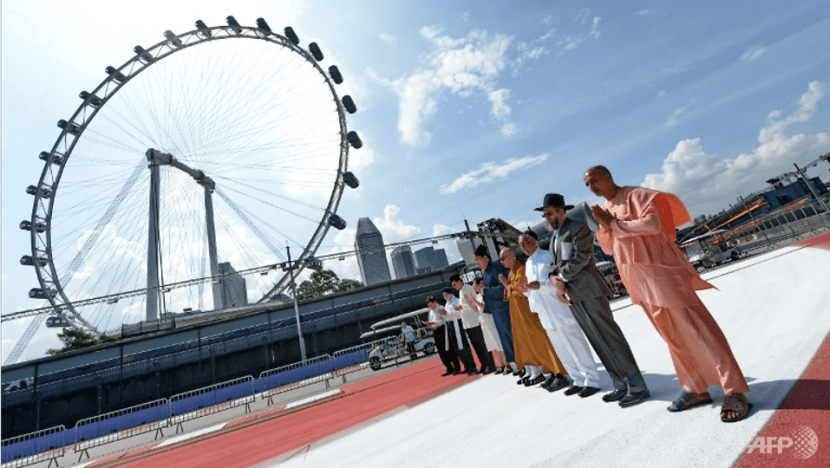More Singaporeans see religion influencing their views in other areas of life: IPS study
Nationality was consistently rated as the most important part of one's identity, in a survey of 4,000 Singaporeans.


This audio is generated by an AI tool.
SINGAPORE: A growing share of Singaporeans see religion as a key element in their lives, with a majority saying their faith influences their views in other areas, according to a new study by the Institute of Policy Studies (IPS).
Over three-quarters of 4,000 people polled in 2024 indicated that their ideas about religion or spirituality are one of the most important parts of their philosophy in life. And these ideas have a considerable impact on how they conduct themselves at work or in their business strategies.
These proportions have increased compared to a prior study in 2018.
Done by researchers Mathew Mathews, Teo Kay Key, Izzul Haziq Murad and Melvin Tay, the findings were released on Wednesday (Aug 20) in a working paper titled Religious Identity and Practice Among Singaporeans.
"In terms of the importance of religion, 61.1 per cent of the total sample considered it important or very important in 2024. But when only respondents with declared religious affiliation were included, the proportion rose to 73.7 per cent," they wrote.
The study found that 73.9 per cent of respondents agreed their spiritual beliefs give meaning to their lives' joys and sorrows, while 68.3 per cent said they try to find out what their God or religion thinks is the best course of action when faced with life choices.
Over six in 10 agreed that daily life would be meaningless without a sense of spirituality; that they accept what their religious teachers tell them about how they should live their lives; and that having a religion is necessary to be fulfilled in life.
"The general rate of agreement regarding the influence of religion on respondents’ lives increased in 2024 compared to 2018 for all the statements presented to respondents," wrote the researchers.
NATIONALITY AS TOP IDENTIFIER
The surveys, which lasted about 45 minutes and comprised around 350 questions, were conducted from April to August last year. The questions covered topics such as identity markers, daily experiences in a multiracial society and various policy issues.
"Across all waves of the survey, nationality was consistently rated as the topmost important part of their identity. Singapore was rated consistently as the most important identity component across waves and most demographic characteristics," wrote the researchers.
Respondents were asked to rank the most important parts of their identity based on nine factors – race, religion, nationality, sexual orientation, country of origin, age, gender, profession and educational background.
Nationality was the most popular option at 35.9 per cent, followed by race at 20.6 per cent and religion at 16.1 per cent.
On the other hand, the country where respondents' families originally came from was consistently ranked lowest.
The study also found that Muslims were more likely to find religion very important to their overall identity compared to those from other religions.
Older, lower-educated and less affluent respondents were also more likely to view religion as important to their overall sense of identity.
When it came to religious traditions, one in three respondents felt that religion should be kept as pure or traditional as possible, a slight increase compared to 2018.
"Christians and Muslims were more likely to prefer religion in its pure or traditional form, while there was a significant decline in the proportion of Catholics who felt this way when comparing 2024 to 2018," wrote the researchers.
They also found that praying outside religious settings - like churches and mosques - was the most frequent practice, with 15.7 per cent of respondents in 2024 saying they do it on most days. This was down from 20.4 per cent in 2013 and 16.3 per cent in 2018.
IPS said Christian respondents reported lower frequencies of attending religious services and praying, but increasing frequencies of consuming religious media. For Muslim respondents, the frequency of all religious practices increased over the years.
IMPLICATIONS FOR SINGAPORE SOCIETY
The survey results show a growth in religious identity and orientation among religiously affiliated Singaporeans, said researchers.
With the greater salience of religious identity here, there is a possibility of religious groups pushing more for their beliefs to be considered in policymaking, they added.
"Religious individuals may also feel that their traditions should be given greater public attention and space. Currently, Singapore has managed to strike a balance between allowing for religious practices in the public space in relation to secularism," they wrote.
They cited the example of Muslim female nurses being allowed to wear their tudung while at work.
"While this stronger sense of identity and community amongst religious affiliates can help provide comfort and support, especially through difficult times, there may be implications to religious harmony, if these growing ties also lead to more jostling for space and influence between the various religious groups," said the researchers.
Any potential rise in inter-group friction could be mitigated with Singapore’s framework to maintain religious harmony, they said, but refinements will always be needed to manage the delicate balance.
The researchers noted the importance of engaging religious stakeholders on matters of social cohesion, and also as channels for the dissemination and support of national priorities, such as vaping, online harms or other public health and societal concerns.
The survey results also show that a substantial number of people look to religion for guidance on a range of issues, said the researchers.
"Religious leaders and organisations, by virtue of their community reach and moral authority, can serve as critical partners in reinforcing positive norms and complementing state efforts."
Editor's note: The percentage of respondents who considered religion to be important in 2024 has been amended in this article after IPS corrected its figure.
















